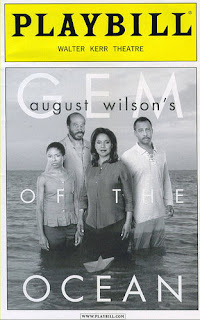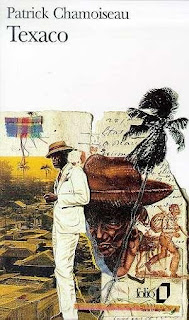Tuesday, November 2, 2010
French Like Me (Part 8)
filed under: french like me 8.
8.
I made reservations with the cheapie airline Air India to return to Paris in August. The cash came from a literary magazine putting me on a bus to Massachusetts to talk with playwright August Wilson. Gem of the Ocean, his latest production, was about to run in Boston and we spoke for a few hours at a local Au Bon Pain. The money from the story paid for my ticket, and I’d saved enough to stay until my book tour in late September.
I awaited the next Greyhound leaving for New York sitting balled up on a bench at South Station, nauseous and clammy. What is this about?, I thought groggily, remembering the coffee and Marlboro Lights I shared with August. (I didn’t regularly smoke or drink coffee.) He was one of my favorite living writers, sure, but interviews had never given me a nervous stomach before. I barely made it to the men’s room in time to regurgitate my croissants.
I might have suddenly been anxious about moving to Paris. I spent the four-hour ride to Boston reading through a sheaf of papers I’d recently picked up from the French Embassy. The bureaucracy of becoming an immigrant in France was never something I’d considered, especially after my friend Miguel advised that a residence permit wasn’t strictly necessary. But just packing up and moving to France wasn’t that simple. My American passport officially allowed me to stay in the country for three months only, and I couldn’t work legally without a permit. In order to apply for a residence card, a carte de séjour, the embassy needed copies of my bank account balance to prove I was rich enough to live there jobless. Yet the dollar amount that would satisfy them was arbitrary, decided on a case-by-case basis. They also wanted a letter explaining why I wanted to move and a note from a landlord or lover saying I had a place to live.
I bought some bottled water and stood on line for the long ride home, thinking. My dream scenario, I imagined, was to support myself coasting from book deal to book deal. The dollar wasn’t real strong, but all my royalties could be exchanged for euros and I wouldn’t have to find work. My hopeful intentions probably weren’t enough to make the French Embassy happy, that I already knew. Reasonable doubts started creeping into my grand plans for Parisian exile, but thoughts of being together again with Christine renewed my faith. We were on the phone just yesterday, excited to be reunited soon. Texaco by Patrick Chamoiseau was my Greyhound reading material on Christine’s suggestion, and the novel was a constant reminder of her.
 I wondered who could be considered the French August Wilson, whose work explains the black French condition. I wasn’t a Francophile; poet Aimé Césaire was the only French artist I knew who fit that description, and I wasn’t familiar with his work, just his reputation. Being exposed to August Wilson, Gordon Parks, Toni Morrison, Romare Bearden, Alvin Ailey or any number of other black artists yields a lot of information about African-Americans. But where were the mouthpieces that could help me navigate understanding blacks in France? I asked Christine; she put me on to Texaco.
I wondered who could be considered the French August Wilson, whose work explains the black French condition. I wasn’t a Francophile; poet Aimé Césaire was the only French artist I knew who fit that description, and I wasn’t familiar with his work, just his reputation. Being exposed to August Wilson, Gordon Parks, Toni Morrison, Romare Bearden, Alvin Ailey or any number of other black artists yields a lot of information about African-Americans. But where were the mouthpieces that could help me navigate understanding blacks in France? I asked Christine; she put me on to Texaco.
Grasping French culture through comparative analogies was the easiest way to do it at this point. I was looking for the Harlem Renaissance and the Black Arts Movement of Paris, and what qualified most were négritude of the 1930s and créolité of the eighties, developed in part by Chamoiseau. The négritude phrase used to make good copy at the urban mags I’d worked at. But until googling around recently, I was never crystal clear on what it was: a literary and political movement started by Aimé Césaire (at twenty-two!), future Senegalese president Léopold Senghor and French-Guianan poet Léon Damas. Négritude was first coined by Césaire in his own L’Étudiant Noir literary journal, and stood for solidarity with Africa and a rejection of French colonialism. The shared African root of the worldwide black diaspora was its linchpin concept.
Créolité was completely new to me, an evolution away from négritude. Three Martinican writers—Patrick Chamoiseau, Raphaël Confiant and Jean Bernabé—published In Praise of Creoleness in 1989 to play up the indigenous cultural value of the colonized Caribbean islands, rejecting the imperialistic influence of France and vestiges of Africa. Ironically Chamoiseau’s Texaco scored France’s prestigious Prix Goncourt literature prize, won in the past by Simone de Beauvoir and Marcel Proust. My bus started boarding passengers as I recalled something August Wilson mentioned hours ago.
“How specifically was the blues an influence on your work?” I’d asked him.
“Blues is the bedrock of everything I do,” he said, blowing smoke through his nose. “All the characters in my plays, their ideas and their attitudes, the stance that they adopt in the world, are all ideas and attitudes that are expressed in the blues.”
August continued describing the blues as a way to learn black Americans’ ideas and attitudes toward pleasure and pain, who we are and what we think about. I handed my ticket to the bus driver wondering if anything like that existed for the black French. I’d heard zouk (the compas-like Caribbean party music) on the salsa boat, but it was too festive to be as revealing as the blues. French hiphop might qualify, but the language barrier was too thick for me to learn anything from yet. Taking a seat at the head of the bus, I formed an idea: I could pour my interest into a regular column. “Paris Noir” could explore the black side of France that nobody seemed to know a lot about, from my American outsider perspective.
Could French blacks exploit their own culture as a commodity to improve their socioeconomic standing, like we did with hiphop in America? From my grandparents’ South Bronx windows, I’d watched hiphop gradually spawn magazines, clothing companies, TV shows, literature, motion pictures, artwork, theater, recording studios and more. This all created untold opportunities for people whose options might have been more limited in a world without hiphop. (I could have started my writing career without the urban media, but it certainly helped.) Our walk, our talk, our fashion, our attitudes were all the cornerstone of a billion-dollar industry. What did the urban French have culturally to uplift their situation?
As the bus pulled out of South Station, I kept on brainstorming the column idea, with the strong feeling that I’d just given myself a cause to wander Paris like a flâneur and get paid for it.



Sia at 4:48 AM on 11/04/10:
Thank you so much, I found your site by lets say a “GOD/GODDESS” sent…. I just started the planning stages to make this move to live in Paris for a year a month ago. As my mother or grandmother, I forget which and may of been both said that “God/Goddess gives you everything you need, which in turn opens doors for you to produce what I call your “born gift” to the world. This is true sign that this is my right path, for I found this site by pure accident, on other person facebook page, because I was attracted to the picture of you and your son WOW! I will continue to read and follow the info. as I prepare, thanks again this has and will be very helpful…..Bless